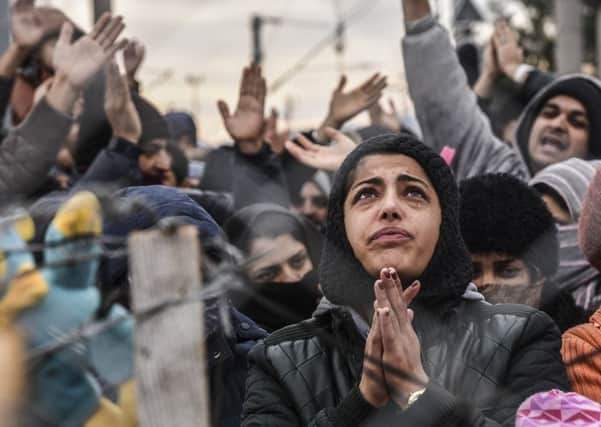Over one million migrants arrived in Europe in 2015


With just days left in 2015, the Geneva-based intergovernmental organisation said the million mark was crossed on Monday–- marking more than a four-fold increase from last year and a symbolic milestone amid the fallout of war, poverty and persecution in Africa and the Middle East.
The IOM said more than 800,000 people crossed into Greece from Turkey, including more than 455,000 from Syria and over 186,000 from Afghanistan.
Advertisement
Hide AdAdvertisement
Hide AdNearly 3,700 others died trying to cross the Mediterranean in Europe’s worst refugee crisis since the Second World War.
Germany has seen around one million migrants arrive this year, but that figure includes large numbers of people from Balkan countries who arrived earlier in 2015.
Most of the migrants who died, 2,889, were making the sea crossing between north Africa and Italy, while more than 700 died in the Aegean crossing to Greece from Turkey.
Only 3.5 per cent of migrants made a land journey to Greece or Bulgaria via Turkey. The IOM gathers its statistics from registrations, law enforcement agencies and its own monitors. IOM director general William Lacy Swing said it was not enough to just count the figures.
He said: “We must also act. Migration must be legal, safe and secure for all – both for the migrants themselves and the countries that will become their new home.”
A joint IOM and UNHCR statement said “a more co-ordinated European response is beginning to take shape”.
However, it said more needed to be done to improve reception facilities, accommodation, registration and to identify those who do and do not qualify for refugee protection.
Responding to the latest milestone, Save the Children campaigns director Kirsty McNeill said: “This is the test of our European ideal. When children are dying on our doorstep we need to take bolder action. There can be no bigger priority.”
Advertisement
Hide AdAdvertisement
Hide AdThe migrant crisis has led some European states to put up fences and introduce border controls despite the EU’s border-free Schengen area. The EU last week agreed to increase the numbers of Frontex border agency staff in Greece, a key arrival point.
Once they arrive in Greece, many migrants then try to travel north via the Balkan states, many heading for Germany and the Nordic countries.
Germany alone has received a million refugees and migrants this year, although many were already within Europe.
Macedonia is now refusing to allow anyone through its Greek border who does not come from a war zone.
A UN report also last week warned that the number of forcibly displaced people worldwide would “far surpass” 60 million this year.
In an effort to stanch the flow, the EU will give Turkey €3 billion (£222 million) to cope with Syrian refugees and ease visa restrictions for Turkish nationals. It has already sped up Ankara’s membership process.
In exchange, Turkey is to crack down on migrants leaving for Greece.